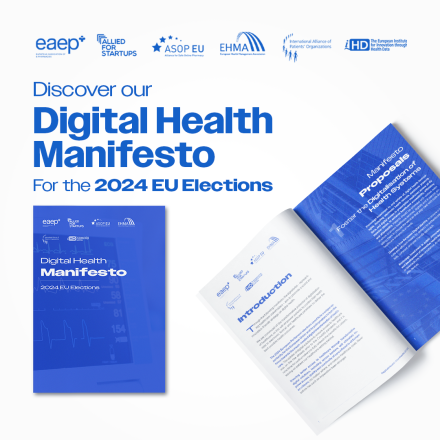This website uses cookies so that we can provide you with the best user experience possible. Cookie information is stored in your browser and performs functions such as recognising you when you return to our website and helping our team to understand which sections of the website you find most interesting and useful.
The patient empowerment self-care solution
11 April 2017
Findings in the UK have shown that there are around 57 million GP consultations a year for minor ailments at a total cost to the National Health System (NHS) of £2 billion [i]. These consultations take, on average, an hour a day of every GP’s time. As health systems across the EU look to a future of budgetary strains [ii] and health professional shortages [iii] related to the aging population [iv], patient empowerment and the expansion of self-care provides an interesting solution that could bring benefit to both the patient and health system alike.

A recent EU study described self-care as “what individuals, families and communities do with the intention to promote, maintain, or restore health and to cope with illness and disability with or without the support of health professionals such as pharmacists, doctors, dentists and nurses. It includes but is not limited to self-prevention, self-diagnosis, self-medication and self-management of illness and disability [v]”.
The self-care continuum

The above figure shows the sliding scale of self-care used in the UK [vi]. On one side, you have pure self-care and on the other pure medical care. In single payer systems, this scale can often be heavy on the side of medical care. People are very happy to control the basic things, the ‘daily choices’ associated with their lifestyles (person hygiene, eating and drinking habits, and exercise decisions), however other health related choices they quickly cede to the professionals.
Because medicine has been marketed as too complex for the mass, patients often feel unqualified or under-prepared to implement self-care. They feel marooned by the complex language of acronyms and lingo; and they feel overwhelmed with the choices in medicines and procedures. That is why a recent EU report on self-care promoted the need for a change in ‘culture’ [vii].
To help empower the individual, medicine needs to provide support. The language needs to be simplified and patients need easy to understand education about minor ailment and their long-term conditions. They need opportunities to practice skills, resolve potential issues, and ask questions. The patient needs to feel more in control so that they can take more responsibility further along the continuum. This will allow them to live healthier and more independent lives, and allow health professionals to spend more time and resources on the patients that cannot help themselves.
What action is being taken on the European level?
To improve self-care the European Commission has funding two separate European level projects. Each of these projects approach self-care in different way.
- EMPATHiE (December 2013 – September 2014)
This project worked at empowering patients in the management of their chronic diseases by identifying models of best practice, analysing those models, developing methods to validate the transferability of good practices (across disease areas and in different countries’ contexts), and in developing potential scenarios for future European collaboration.[viii]
- PiSCE (September 2014-May 2017)
This was a pilot project that just ended on the promotion of self-care systems in the European Union. In PISCE they did a cost/benefit analysis of patient self-care oriented health systems in the European Union and the current frameworks in place to enhance self-care oriented heath care systems and patients’ empowerment. Then they created a panel of experts in self-care and healthcare, including representatives of healthcare providers, patient groups, healthcare professionals, academics, communication experts and other relevant stakeholders with experience in policy making both at EU and national level. This platform of experts then produced guidelines to promote self-care and proposed action and collaborations to help the implementation of self-care for these five minor conditions: Athlete’s foot, Cold, Cough, Heartburn (without indigestion), and Lower urinary tract infection.[ix]
Read more about self-care in Europe
- Cost/benefit analysis of self-care systems in the European Union – http://ec.europa.eu/health//sites/health/files/patient_safety/docs/2015_selfcaresystemsstudy_en.pdf
- EMPATHiE final report – http://ec.europa.eu/health//sites/health/files/patient_safety/docs/empathie_frep_en.pdf
- PiSCE platform of experts – http://www.selfcare.me/?page_id=5
- AESGP presentation on self-care – http://www.aesgp.eu/self-care/about-self-care/
Other interesting and related topics
- A patient friendly medical language – http://www.wapatientsafety.org/downloads/GHC-Plain-Language-Toolkit.pdf
- The underutilization of pharmacist – https://www.pharmacists.ca/cpha-ca/assets/File/education-practice-resources/Translator2013V7-2EN.pdf
This blog was written by Nathan Malan
[i] http://www.selfcareforum.org/about-us/what-do-we-mean-by-self-care-and-why-is-good-for-people/
[ii] http://www.epc.eu/documents/uploads/pub_6951_sustainabilityeuropeanhealthsystems.pdf
[iii] http://www.euro.who.int/__data/assets/pdf_file/0008/91475/E89156.pdf
[iv] http://www.euro.who.int/__data/assets/pdf_file/0004/64966/E92560.pdf
[v] http://ec.europa.eu/health//sites/health/files/patient_safety/docs/2015_selfcaresystemsstudy_en.pdf
[vi] http://www.selfcareforum.org/about-us/what-do-we-mean-by-self-care-and-why-is-good-for-people/
[vii] http://ec.europa.eu/health//sites/health/files/patient_safety/docs/2015_selfcaresystemsstudy_en.pdf
[viii] http://ec.europa.eu/health//sites/health/files/patient_safety/docs/empathie_frep_en.pdf
[ix] http://www.selfcare.me/
Recent News

ENVI Committee voting on the EU Pharmaceutical Strategy

Appointment of new Interim Executive Director

Our Digital Health Manifesto for the European elections 2024
What our Members say
I have been active in EHMA since the first years of the '90s and I have seen its evolution from a small association of members interested in sharing knowledge on health management practices to the current status of reference and advisory key player for EU, health systems and organisations, stakeholders associations, industry and universities. EHMA is now a unique knowledge hub, policy advisor, community of practice and network of best in class organisations involved in health policy and management. A place where health managers can build their competences, policy-makers and stakeholder associations envision how to implement and sustain change through health management, industry leaders understand how to engage more effectively with health organisations and systems. The right place to nurture and grow health management capabilities and capacity for every stakeholder of health systems.
Prof. Federico Lega, University of Milan, Italy
Health management has a crucial function in shaping public health and health system challenges. The Medical University of Varna, Bulgaria had success in collaborating with EHMA on EU-funded projects that has resourced us to create new health management competencies for the future workforce. In addition to all classical definitions, health management is a science dealing with individuals, groups, and society at large. It is an art contributing to the beauty of our lives and an interactive communication process at all levels of institutions and human energy. I have also had the pleasure to chair the South Eastern European Special Interest Group which gives members a space to discuss and tools to address how health systems are managed in our regions.
Prof. Todorka Kostadinova, Medical University of Varna, Bulgaria
I enjoy the high level of interaction and engagement in EHMA’s activities, in particular during the annual conference where the panel discussions are rich and well prepared. As a hospital manager and professor of health management, EHMA motivates and inspires me to be creative. You go back home feeling energised from seeing old friends and making new connections, as well as being convinced of serving as EHMA’s ambassador. It’s a strong feeling of interdisciplinary engagement, but it also feels like being part of family-like community.
Prof. Sandra C. Buttigieg, University of Malta, Malta
EHMA is a pre-eminent organisation for everyone working in planning, managing and delivering health services across Europe. As a long standing member of EHMA I have always been impressed by the vibrant community of managers, researchers and academics it has created and by the many opportunities for sharing knowledge and funding opportunities it has brought to its members. Its international scope is impressive and its impact is often felt in management and research across European and national health systems.
Prof. Axel Kaehne, Edge Hill University, UK
Health workforce has become more essential in operating, managing and maintaining health systems lately, particularly in crisis and emergency situations. European healthcare professions and the workforce need to be high on the agenda of managers and decision makers. The Health Services Management Training Centre, Semmelweis University in Hungary is a longstanding EHMA member, because it connects us with collaborators and experts, with whom we can have complex debates, from whom we can learn and at the end find solutions in various challenging fields of healthcare management.
Dr Eszter Kovács, Health Services Management Training Centre, Semmelweis University, Hungary
As a hospital administrator and health management professor, I see on a daily basis that the healthcare challenges require talented and skilled managers to transform it. the EHMA membership has been beneficial to bring healthcare management research and education to the demanding healthcare services world, promoting healthcare management competencies and knowledge creation.
Dr Alexandre Lourenco, APAH - Association of Portuguese Hospital Managers, Portugal
Many healthcare systems in Europe and beyond are facing similar challenges which require innovative and creative solutions. EHMA’s annual conference, webinars, Programme Directors’ group and other activities and resources provide incredible opportunities for networking, connecting and sharing experiences. A distinct feature of EHMA is the diversity of members with representation from many countries, sectors and different communities of practice – academic, policy-makers, practitioners, managers, leaders and students. The annual conference is a highlight in the calendar year, offering a friendly, fun and learningful environment for emerging and established members to engage, collaborate and meet up with old and new friends. I am proud to be a member of the EHMA Board.
Prof. Ann Mahon, University of Manchester, UK
Society evolution, pandemics and ageing modify health needs. So, health policies and services are to change dramatically. EHMA, through webinars, workshops and annual conference provides an excellent insight to a professional changing world, favouring closeness to management innovation and the protagonists of these changes. As a primary care services’ manager, participating in EHMA activities is really worth it and allows to involve oneself in the innovation processes.
Dr Antoni Peris Grao, Consorci Castelldefels Agents de Salut (CASAP), Spain